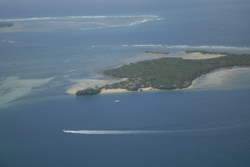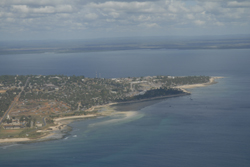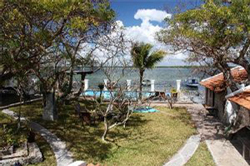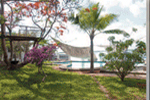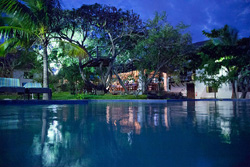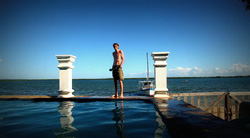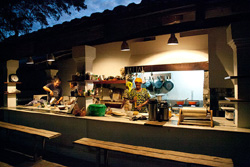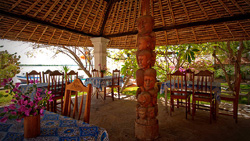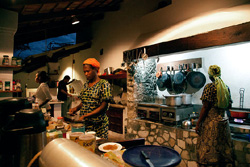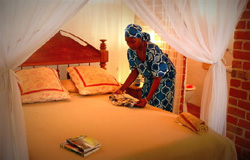| Situated within the Quirimbas National Park
in the North of Mozambique lies a small tropical island where time stood
still. Take an adventurous trip to come and discover the many secrets
Ibo island has to offer…
Embark on a romantic stroll through the dusty streets of Ibo and admire
the remnants of a glory long gone. Will nature win its battle over human
settlements or will Ibo be revived once more… Enjoy Cinco Portas’
hidden garden, a true oasis of green and relaxation with a gentle sea
breeze to cool you down and a well stocked bar to liven your spirits.
Accommodation: Please note that prices do not include
breakfast and all our bathrooms have only cool water. For stays of 1 night
only we add a 20% surcharge.
Apartment: Spacious bedroom with 2 double beds, sharing bathroom downstairs.
Big veranda overlooking mangrove bay. This apartment can, if desired,
be split up in two using a separation screen in between the beds.
Ground Floor Room:
Very small room with 1 double bed, sharing bathroom. Usage of living room
with folding doors and small veranda giving out onto mangrove bay.
Sundeck rooms:
Three new comfortable double rooms have been constructed on top of the
old warehouse. Enjoy the peaceful green of our garden and watch the tides
go in and out from your window. En-suite bathroom.
Traditional rooms:
Enjoy our 2 traditional Swahili-style double bed rooms. These small but
comfortable rooms give into the garden and the extra door can be opened
to watch the street life from the veranda. The rooms have or will have
a small en-suite bathroom and fold out table.
email: book@go.mozbookings.com
Why Come to Ibo?
One comes to Ibo to enjoy the island feeling, to be far removed from all
normal luxuries (constant power, running water, shops that offer everything
you can think off) and consumerism. If you want to be unavailable for
a little while, then this is your place of choice. Cell phone reception
is only possible on the beach, internet connection is almost non-existent.
People on Ibo live modest and simple lives. Many of its inhabitants have
never been in Pemba, the nearest city, and can count their days on the
mainland on one hand. Everybody knows everybody and they have a certain
reserve for foreigners.
History: Walking through Ibo gives you the feeling of
being placed in a time-warp. The ‘bairro cemento’ of Ibo is
like a ghost town with coral stone houses, some recently renovated, others
simply subsiding under the unrelenting sun and steady sea breeze…
Most houses are still inhabited even if they are missing a few walls or
roof tiles. The owners of the houses live as far as Goa, India, Portugal
or closer by, Maputo or Pemba. Looking at the ruins it is easy to imagine
how it must have once looked like, how well organised and developed it
must have been at some stage and how nature is slowly reclaiming the land…
Traditional lifestyle: Ibo is a small island, with access dependant on
the tides. The most used means of transport for the islanders is still
the traditional dhow of all shapes and sizes with improvised or proper
sails. A fair deal of fishermen also use the local dug-out canoes, called
kaskinia, to peddle their way to the best fishing spots.
Most households keep a few goats, but these are mainly reserved for ceremonial
purposes. The goats take in their own special place in family life and
you’ll see them climbing on walls, looking for any sort of shrub
to eat and then return home at night to sleep with their family.
Ibo has some 4000 inhabitants and is situated in the National Park of
Quirimbas. The main activity of ibo’s inhabitants is subsistence
fishing. Tourism is fairly new on the island, which means that you’ll
regularly come across a child that sees a white person for the first time
and runs off with big tears running down its cheeks shouting ‘Wazungu
wazungu’ to the safety of his mom.]
The island itself has a lot of fresh water supplies and is quite fertile
but very few people cultivate the land as a hedonistic lifestyle prevails
(we eat whatever we can pick from the tree, or whatever is in season e.g.
bananas, mangoes, paw paw, coconut). In the Mashambas (vegetable gardens)
you can find manioca, maize, peanuts, and spread all over the island like
a weed you will find Ibo coffee, a very unique Arabica with a distinctive
aroma.
Only in Africa: When you arrive by plane it is not uncommon that your
pilot will fly over the airstrip once before he actually lands. This is
only to chase away the cows, as the airstrip doubles as a grazing ground.
About Cinco Portas Guesthouse
Long before the era of the famous navigators Dias and Vasco da Gamma Ibo
Island offered a refuge for Chinese, Indian and Arab traders. The sheltered
harbour at the entrance of the Quirimbas channel flourished and became
an important trading and governmental centre. During the 20th century
Ibo’s power declined and it became a sleeping town… Only now
it is waking up from its slumber…
Ibo has a historic town with traces of slave trade, gold, ivory and spices,
ancient forts, crumbling mansions surrounded by unspoilt natural reefs,
mangrove forests and coconut groves. Ibo once was the capital of Cabo
Delgado, but is now a peaceful escape from modern life. Maybe your cell
phone will work… Hopefully not…
No place on Ibo captures the spirit of the island like Cinco Portas Guesthouse.
It’s an ideal base from where to explore Ibo’s rich past,
its ruins and its blend of cultures. Apart from an oasis amidst the historical
island we also offer a window from where to watch the fishermen bring
in their catch of the day. Admire the gracious dhows passing and offloading
their wares from the comfort of your deckchair…
The old colonial house and warehouses have been tastefully converted
into a comfortable guesthouse with a lush tropical garden and beautiful
pool. Our variety of clean, comfortable and unique rooms makes a stay
on the island accessible for every purse. The more exclusive apartment
has a private deck with views over the lagoon and mangrove forests surrounding
Ibo..
Our restaurant offers a great mix of local dishes and contemporary home-style
cooking. Feast on a variety of fresh seafood, tropical fruits and a selection
of meat dishes. We will give you information on boat trips, guided walks
and other excursions on Ibo Island or in the Quirimbas Archipelago. The
Cinco Portas staff hopes to welcome you shortly!!!
Activities:
Walks:
Historical Walk: Discover fortress São João
Baptista and its famous silversmiths. This five pointed star fortress
with cannons protruding from the ramparts over the sea below, dates back
from 1791. An old big spreading tree provides shade in the courtyard where
the silversmiths perform their century old tradition.
The sliversmithing tradition that was handed down from generation on
generation is still daily being performed on the island.
Tour down Rua da Republica. This street starts at the central place and
runs parallel to the beach. The buildings once were old shops, trading
houses and huge storage hangars with backyards that open onto the harbour
for easy loading and offloading.
Running parallel is Rua Pia Maria. A quaint street with quaint Portuguese
style cottages and shops.
Past the market you will find Fortim San Antonio, dating from 1818. Fortim
São Jose dates back to 1849 and São João Church testifies
to the once strong Catholic influence on the island. This building was
completed in 1760.
Also of interest are the Church of St John the Baptist, the Hindu Crematorium,
Memorial Praça dos Heroís da Independência, and various
Portuguese style buildings. Explore the historical town at your own leisure
or take a guided tour with Junior, an English and Portuguese speaking
guide.
Duration: 3h - easy walk
Quirimbas Island: Start your walk 2 hours before low
tide and walk across the mudflats through the mangroves to Quirimbas Island
where the German Gestner family has been having a huge coconut plantation
for 3 generations. Relax on the white sand palm fringed beaches and return
by local fisher boat to Ibo.
Duration walk: 2h30 one way trough tidal flats - slippery and strenuous
Ibo Lighthouse: Walk to the end of the world. This low
tide walk takes you past the fortress, along the tidal beach and coconut
groves through the mangroves to an islet called Mujaca. There the Portuguese
built a lighthouse to guide incoming ships into the channel leading to
the Port of Ibo.
Farol Mujaca is of the oldest lighthouses in Mozambique. Peculiar about
this building is that it has a straight staircase leading to an observation
point instead of a staircase running around a square or round building.
The view and the savageness of the sea are stunning
Duration: 4h - easy walk with some more difficult bits.
Cemetery: Get in touch with Ibo’s past by wandering
through the old cemetery and discovering ancient graves with Chinese,
Arabic, Portuguese and French inscriptions.
Duration: 1h - easy walk
Beach:
To be clear, Ibo does not have any palm fringed picture perfect beaches…
Ibo is surrounded by extensive Mangal forests on the one side and a kilometre
wide floodplain on the other side.. Both are interesting habitats for
a wide variety of marine life and attracting lots of wading birds. However
Ibo is quite a big island and there are some remote spots to relax in
the sun without disturbance. So, indeed, there are sand beaches on Ibo
but only at high tide and not in town…
Diving:
Ibo boasts a couple of fantastic dive spots the best of which is at the
Old lighthouse. This is where the coastal shelf drops off into the depths
of the Indian Ocean. There is one dive operator on Ibo Island but please
check with us if he is available if you want to dive on Ibo.
Snorkelling:
There are two good snorkelling spots around Ibo Island. Unfortunately
they both require a boat transfer. You can organise this with a local
dhow captain or our motorboat.
Boat Trips:
We can organise sightseeing trips to Quirimbas or Matemo Island. There
are old channels the Portuguese cut trough the mangroves. These meter
wide channels start from Ibo and go to Quirimbas Island. Once on Quirimba
you can walk back to Ibo at Low tide or simply return by boat.
Alternatively we can take you on a tour around Ibo Island (weather and
tide permitting) where we will pass the channels, the Ibo lighthouse,
the fortress, and port. There is a range of traditional Dhow sailing boats
that are readily chartered for daytrips or multiple day dhow safaris.
Two commercial operators, one a French chef, offer fully organised trips.
The rule here is to have a clear arrangement beforehand so there are no
surprises.
Relaxing:
One of our clients described it nicely in our guestbook. Cinco Portas
is like a Holiday within a holiday. People come for a day and stay for
a week… reading a good book, enjoying our cuisine and the slow island
vibe.
Culture:
It is not uncommon to wake up at night to the sound of drums or a procession
trough the main streets.
A number of age old ceremonies are still practised on the island.. Amongst
others: “Aboruji”, a dance where the men push spikes trough
their cheeks; “Ombi”, circumcision and rite of passage for
the boys; “Riga”, rite of passage when a girl enters womanhood,
clearing a house of demons and ghosts, etc…
Each year on June 24th a small festival is being organised to celebrate
the Fiesta do IBO. Traditional & contemporary song and dance, competitions,
theatre and arts are at a display. Or you could join the “Tomar
de banho” on New Year’s day when the whole village jumps in
the sea to celebrate the new year. The predominant religion on the Island
is Muslim and of course all religious celebrations have their place on
the island.
Directions:
By Road from Pemba:
Via Metuge: 125 Km: Take the main road out of Pemba and turn right on
the Metuge Road to Quissanga. This is a dirt road with many dips, difficult
or closed during rainy season. Enquire beforehand on the condition of
the road and its bridges.
Via Bilibisa: 250 Km (Alternative and better road):
Take the main road out of Pemba and turn right on tar road to Mocimboa
da Praia. Next turn right at the Bilibiza turn-off Intersection signposted
by a big ADPP sign. At the end of this road turn left at the T junction.
This road is 100km longer but mostly tarmac, and passable in all seasons.
For Both routes: From Quissanga, drive on to Tandanhangue.
You can park for a small guarding fee (50-100 Mt per day) at the car park
across or before the mud flats. In Tandanhangue harbour (Baobab beach)
you can negotiate your passage on a dhow or motorboat with one of the
local captains. Prices range in between 50 and 100 Mt. Our small motorboat
can come pick you up for 1000Mt for a 6 pax boat. The cross over by motorboat
takes about 45min. A sailing dhow can take anything between 1 and 5 hours.
Boats leave only at high tide, so you will have to be patient if you
arrived a few hours too early. Currently works have been undertaken to
make your waiting period more comfortable, a small ‘shop’,
toilet and shaded space is now available. Be warned, Tandanhangue has
a lot of mosquitoes. You will need to wade to the boat, so be prepared
to get wet.
Do as locals do, ask price before you get in. Price difference sailing
dhow- motorised dhow. Sailing dhow more romantic but can take a whole
deal longer to get to your destination! Poling through shallow water,
hoisting boom, lateen sail, enjoy the ride. You might see dolphins along
the way or an African Fish eagle. Short cut through mangroves will bring
you straight into the small harbour of Ibo.
By Boat:
Our Cargo boat supplies us once a week from Pemba. The Cinco Portas Boat
is a comfortable 14 meter motorised boat skippered by an experienced crew.
Price for one way passage is 35USD per person. The boat trip takes about
12 hours and takes you past part of the Quirimbas Archipelago. It is possible
to snorkel (bring your own gear!) whilst we offload cargo at the Quililea
island marine sanctuary. Or you can throw out a line and catch some fish
on the way…
The Cinco Portas Boat leaves Pemba every Saturday morning. Remember to
bring plenty of water, a pic nic, fruit and snacks for on the way. The
time of departure is depending on the tide so check with the captain.
The boat returns to Pemba every Wednesday.
It is also possible to negotiate passage on a sailing dhow to or from
Pemba, or Pangane. For this you must go to Paquitequete or Pangane port
yourself and negotiate with a dhow captain yourself. We, nor anybody else,
will get in between you and the captain. Price depends on how good you
are at negotiating and if there is a boat leaving or not.
An indication of charter price of a dhow at the time of writing this
2000mt Ibo Pangane and 3000mt Pemba Ibo. Winds blow generally from the
south from June to August and from the north from November to January.
With good winds this is a most agreeable and adventurous way to travel…
However: No fixed fee applies, no departure is guaranteed, no schedule
applies, no life jackets on board. Please do not pay upfront. Arrival
depends on the wind direction and force. It can take a day to 3 days,
so take plenty of water and food.
Cinco Portas Prices |
Prices are per |
Room Type |
High
Season |
Mid Season |
Low Season |
Tba |
Tba |
Tba |
Tba |
Tba |
Tba |
Tba |
Tba |
Tba |
Tba |
Tba |
Tba |
Tba |
Tba |
Tba |
Tba |
Tba |
Tba |
Tba |
Tba |
email: book@go.mozbookings.com
|
|
| Type of Accommodation at Cinco Portas |
Apartments
Ground Floor Room
Sundeck rooms
Traditional rooms
|
Room equipment |
Ensuite Bathroom
|
Fan/Heater/Aircon |
Fan |
Towels Provided |
Yes |
Distance from beach |
|
Road Access |
4wd
Boat trip |
Collect from Border |
No |
Collect from Airport |
No |
Nearest Border |
Mwambo/Namuirange Tanzania/Mozambique
550km
Milange 1100km Malawi |
Airport Nearby |
Yes
Pemba 550km |
Credit cards accepted |
No |
Pet Policy |
No Pets |
Internet |
No |
Local Mobile Phone coverage |
No - only on the beach |
Power supply |
Mains |
Plug points |
 2 Pin round
2 Pin round
|
Activities/dive centre |
Historical Walks
Diving
Snorkeling
Boat Trips |
Shop |
|
Shops nearby |
|
Drinking Water |
Bottled |
Mosquito nets provided |
Yes |
|
 Mozambique Travel
Mozambique Travel  2 Pin round
2 Pin round